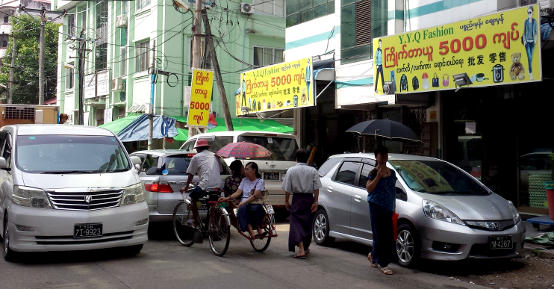Everyday Spoken Burmese
Only and exactly this ပဲ | beare3
Constraint in choice or time. Lack of freedom to do something else. This only and nothing else.
AUDIO
Romanization
English
သူပဲ thu2 beare3 That's him! (He , exactly !)
ဒီလူပဲ de2 lu2 beare3 That's the man! (That man , exactly !)
သူ့ကိုပဲပေး thu1 go2 beare3 pay3 Give it to him only .
AUDIO
Romanization
English
ဒါပဲလား da2 beare3 la3Only this ?
ဒါပဲ da2 beare3 Yes.
After being said what was to be said in a phone call or in a letter --
AUDIO
Romanization
English
ဒါပါပဲ da2 ba2 beare3 That 's all for now.
ဒါပဲနော် da2 beare3 nau2 That 's all for now, OK?
Only and just him သာ | dtha2
This is an another word for "only". There is a slight difference in meaning compared to ပဲ | beare3 . "Just give it to him " here could refer to a task because he is most qualified, not because he needs it the most such as food or money.
In the second example, there is something odd about him to be thinking that way.
AUDIO
Romanization
English
သူ့ကိုသာပေးလိုက် thu1 go2 dtha2 pay3 lite .Just give it to him .
သူကသာထင်နေတာ thu2 ga1 dtha2 htin2 nay2 ta2 .Only he is thinking that way.
Another usage of သာ | dtha2 is in combination with ဆိုရင် | hso2 yin2 meaning "if" as in "If I were him I would do things differently."
AUDIO
Romanization
English
ကျွန်တော်သာဆိုရင်ဒီလိုမလုပ်ဘူး kja1-nau2 dtha2-hso2-yin2 de2 lo2 ma1 -loat bu3 .I wouldn't have done like this if I were him
Want word ချင် | chin2
The want word is not a stand-alone verb but a verb-suffix particle that comes after the verb.
AUDIO
Romanization
English
စားချင်တယ် sa3 chin2 deare2 I want to eat .
Of course တာပေါ့ | da2 bau1
Words of agreement.
AUDIO
Romanization
English
ဟုတ်တာပေါ့ hote da2 bau1 Of course!
AUDIO
Romanization
English
သွားတာပေါ့ thwa3 da2 bau1 Of course, we will go .
သွားကြမလား thwa3 ja1 ma1 -la3 Shall we go ?
သွားကြတာပေါ့ thwa3 ja1 da2 bau1 Of course.
AUDIO
Romanization
English
ရမလား ya1 ma1 -la3 Can this be done?
ရတာပေါ့ ya1 da2 bau1 Of course!
AUDIO
Romanization
English
ကြည့်ကြသေးတာပေါ့ kji1 ja1 thay3 da2 bau1 We will see about that. (till then, I agree.)
တော်သေးတာပေါ့ tau2 thay3 da2 bau1 You were lucky. It was a good thing. It could have been worse. (still suitable .)
ရယ်တာပေါ့ yi2 da2 bau1 You're funny! (laughing at your threat.)
Whatever တာ | da2
This suffix particle changes a verb or an adjective into a noun clause.
AUDIO
Romanization
English
ကြိုက်တာယူ kjite da2 yu2 Take like .
kjite = to like. kjite da2 = kjite da2 = thing that you like
ကြိုက်တာယူ ၅၀၀၀ kjite da2 yu2 nga3 htoun2 Take like , only 5,000 .
AUDIO
Romanization
English
လုပ်ချင်တာလုပ် loat chin2 da2 loat Do want (to do) .
ကြီးတာရွေးယူ kji3 da2 yway3 yu2 Choose and take the big one .
AUDIO
Romanization
English
ညာတာ မကြိုက်ဘူး nya2 da2 ma1 -kjite bu3 I don't like lies . nya2 = to lie
ညာတာ လုံးဝ မကြိုက်ဘူး nya2 da2 lone3-wa1 ma1 -kjite bu3 I absolutely don't like lies .
Extreme degree လိုက်တာ | lite ta2
The verb or adjective is still changed into a noun , but it refers to
the experience or encounter with something to the extreme degree.
AUDIO
Romanization
English
ဆာလိုက်တာ hsa2 lite da2 I am so hungry .
တော်လိုက်တာ tau2 lite da2 You are so good/skillful .
ပူလိုက်တာ pu2 lite da2 It's so hot .
(Also see လိုက် | lite .)
Better than expected သားပဲ | dtha3 beare3
Something turned out to be right or better than expected. It can be pronounced either tha3 or softer dtha3 .
AUDIO
Romanization
English
ဟုတ်သားပဲ hote tha3 beare3 That's right ! (Not what I thought, though.)
တော်သားပဲ tau2 tha3 beare3 Hey, he's quite good! (or) Hey, the trousers fits !
ရသားပဲ yah1 tha3 beare3 Wow, it could be done! (be possible )
A positive statement တာပဲ | da2 beare3
AUDIO
Romanization
English
သိပ်ကောင်းတာပဲ thate koun3 da2 beare3 That's very good .
ဒါလည်းဟုတ်တာပဲ da2 leare3 hote da2 beare3 That too is right !
AUDIO
Romanization
English
ဒီလိုလုပ် de2 lo2 loat Do like this .
ရတာပဲ ya1 da2 beare3 Sure, why not?
ဒါလည်းရတာပဲ da2 leare3 ya1 da2 beare3 It can be done like that , too
Question Words ဘာ - လဲ | ba2 xxx leare3
What and why. ဘာ | ba2 can be either pronoun or adjective . If you just point to a noun without mentioning it, it is a pronoun .
AUDIO
Romanization
English
ဘာလဲ ba2 leare3 What ? What's the matter?
ဒါဘာလဲ da2 ba2leare3 What is this ?
ဒါဘာတွေလဲ da2 ba2dway2 leare3What are those
ဒါဘာကားလဲ da2 ba2 ka3 leare3 (1) What model is this car ?What number is this bus ?
AUDIO
Romanization
English
ဘာကြိုက်လဲ ba2 kjite leare3 What do you like ?
ဘာဟင်းကြိုက်လဲ ba2 hin3 kjite leare3 What dish do you like ?
AUDIO
Romanization
English
ဘာမှာမလဲ ba2 hma2 ma1 -leare3 What do you want to order ?
ဘာဟင်းမှာမလဲ ba2 hin3 hma2 ma1 -leare3 What dish do you want to order ?
Second ba2 is adjective because the noun hin3 (dish) follows it.
In an exception case, it sounds more like "how" in English.
AUDIO
Romanization
English
ဘာလုပ်ရမလဲ ba2 loat ya1 ma1 -leare3 What should I do ?
ဘာဆက်လုပ်ရမလဲ ba2 hset loat ya1 ma1 -leare3 How proceed ?
Why or why didn't you ?
AUDIO
Romanization
English
ဘာဖြစ်လို့လဲ ba2 pfyit lo1 leare3 Why?
ဘာဖြစ်လို့သွားတာလဲ ba2 pfyit lo1 thwa3 da2 leare3Why did you go? (why + reason for going )
ဘာဖြစ်လို့မသွားတာလဲ ba2 pfyit lo1 ma1 -thwa3 da2 leare3Why didn't you go? (why + reason for not doing )
ဘာဖြစ်လို့လုပ်တာလဲ ba2 pfyit lo1 loat da2 leare3Why did you do? (why + reason for doing )
ဘာဖြစ်လို့မလုပ်တာလဲ ba2 pfyit lo1 ma1 -loat da2 leare3Why didn't you do? (why + reason for not doing )
Why is --? What's the reason?
AUDIO
Romanization
English
ဘာကြောင့်လဲ ba2 joun1 leare3 Why?
လှုပ်နေတာဘာကြောင့်လဲ hloat nay2 ta2 ba2 joun1 leare3 Why is it shaking? (reason to be shaking)
မီးမလာတာဘာကြောင့်လဲ mi3 ma1 -la2 da2 ba2 joun1 leare3 Why is there no light? (reason for mi3 ma1 -la2 = light not come ).
In an exception, ဘာ | ba2 is not a question of "what" or "why", but more like "which" in English.
AUDIO
Romanization
English
ဘာကားစီးရမလဲ ba2 ka3 si3 ya1 ma1 -leare3 Which bus should I take? What (number) + vehicle + ride + Should I
ဘယ်ကားစီးရမလဲ beare2 ka3 si3 ya1 ma1 -leare3 Which bus or car should I take?
In the second question, the cars or buses are in sight. The first question can be asked even before leaving the house. City of Yangon has new bus routes starting January 16th, 2017. See all the routes with maps and names of bus stops at http://ygnbusdirectory.com/ .
Question Words ဘယ်- လဲ | ba2 xxx leare3
Where, which, who, whose, how much, how many, when, how, questions all contain those two words.
AUDIO
Romanization
English
ဘယ်လဲ beare2 leare3 Where to?
ဘယ်မှာလဲ beare2 hma2 leare3 Where is it?
ဘယ်မလဲ beare2 ma1 -leare3 Where is it?
ဘယ်သွားမလဲ beare2 thwa3 ma1 -leare3 Where are you go ing? [Taxi driver to passenger]
ဘယ်သွားကြမလဲ beare2 thwa3 ja1 ma1 -leare3 Where are you (guys) go ing?
ဘယ်သွားမလို့လဲ beare2 thwa3 ma1 -lo1 leare3 Where are you go ing? [For example, upon seeing changing clothes.]
ဘယ်မှမသွားဘူး beare2 hma1 ma1 -thwa3 bu3 I am not go ing anywhere.
ဘယ်သွားချင်လဲ beare2 thwa3 chin2 leare3 Where do you want to go ?
ဘယ်ဟာလဲ beare2 ha2 leare3 Which one ?
ဘယ်သူလဲ beare2 dthu2 leare3 Who ?
ဒါဘယ်သူလဲ da2 beare2 dthu2 leare3 Who is this ?
ဒါဘယ်သူ့ပိုက်ဆံအိတ်လဲ da2 beare2 dthu1 pike hsun2 ate leare3 Whose purse is this?
ဘယ်လောက်လဲ beare2 lout leare3 How much?
ဘယ်ဈေးလဲ beare2 zay3 leare3 How much?
ပိုက်ဆံဘယ်လောက်လိုချင်လဲ pike hsun2 beare2 lout lo2 chin2 leare3 How much money do you want ?
ဘယ်နှယောက်လဲ beare2 hna1-yout leare3 How many persons?
ကားဘယ်နှစီးလာလဲ ka3 beare2 hna1-si3 la2 leare3 How many cars came ?
ဘယ်တော့လာမလဲ beare2 dau1 la2 ma1 -leare3 When will you come ?
ဘယ်အချိန်လာမလဲ beare2 a-chain2 la2 ma1 -leare3 What time will you come ?
ဘယ်လိုလဲ beare2 lo2 leare3 How was it? How did it go?
ဘယ်လိုသွားမလဲ beare2 lo2 thwa3 ma1 -leare3 How shall we go ?
In some exceptions, ဘယ်လို | beare2 lo2 sounds better if translated as "what" in English.
AUDIO
Romanization
English
ဘယ်လိုလုပ်ကြမလဲ beare2 lo2 loat ja1 ma1 -leare3 What should we do now?
Question Word တုံး | dome3
This ending word is sometimes used in place of လဲ | leare3.
AUDIO
Romanization
English
ဘယ်တုံး beare2 dome3 Where to?
ဘာတုံး ba2 dome3 What?
ဘယ်လိုတုံး beare2 lo2 dome3 How did it go?
May this happen ပါစေ | ba2 zay2
A wish and letting things happen.
AUDIO
Romanization
English
စားပါစေ sa3 ba2 zay2 Let him eat .
ကျန်းမာပါစေ၊ ချမ်းသာပါစေ kjan3-ma2 ba2 zay2 chan3-dtha2 ba2 zay2 May you be healthy , find peace and happiness.sate -chan3-dtha2 = mind to be wealthy = happy
နေပါစေတော့ nay2 ba2 zay2 dau1 Never mind. Let it be.
Please let me ပါရစေ | ba1-ya1 zay2
A permission is requested.
AUDIO
Romanization
English
သွားပါရစေ thwa3 ba1-ya1 zay2 Please let me go . Please release me.


